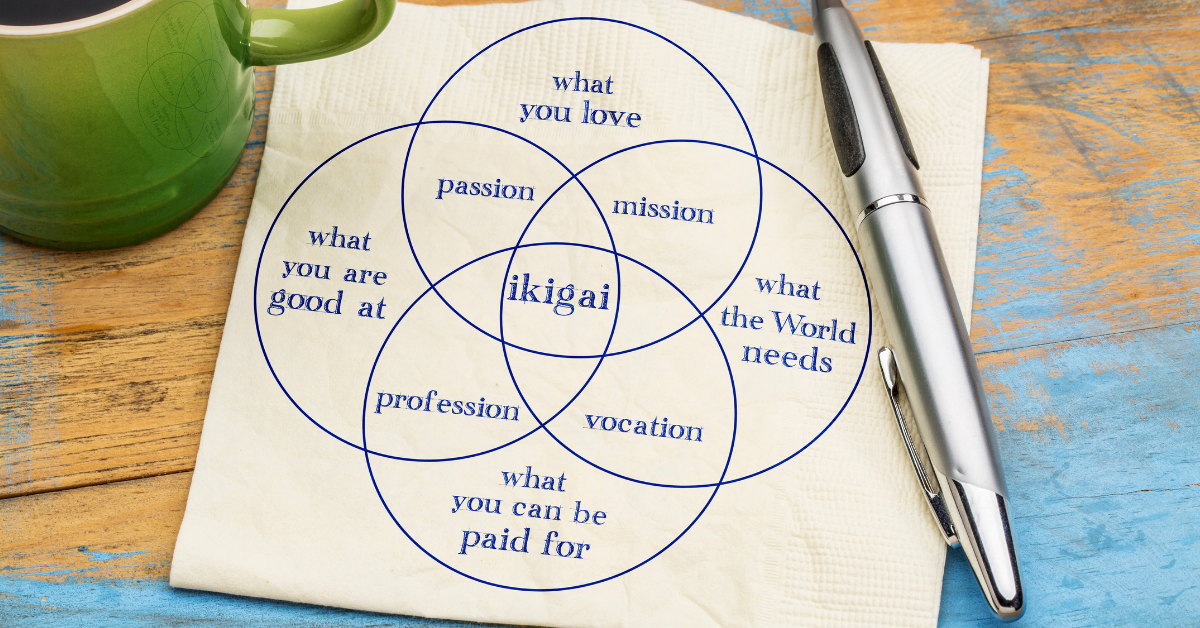
Ikigai – Finding Purposeful Living
The desire to find our own purpose in life and our career is not a new concept. But many times within that life we find ourselves searching for that “reason for being”, or in other words, what is it that I am supposed to be accomplishing with my life?
We were recently introduced to the concept of Ikigai. This concept is to find the rare combination between passion through purpose and aligning happiness, all while being busy in today’s fast paced world. So, let’s analyze Ikigai a bit further.
What is Ikigai?
Ikigai (pronounced ee-kee-guy) can be translated in a variety of ways such as “reason to live” or “reason for being”, but they all revolve around the concept of a person’s purpose in life.
It’s important to understand that Ikigai isn’t dependent on one factor of life, so it isn’t solely dependent on your career or financial status. Is it important to feel fulfilled at work? Yes, but Ikigai has many more parts and pieces to it.
In order to feel completely fulfilled, people need to find a combination of what they love, what they’re good at, what the world needs, and what they can be paid for. Without each of those four factors there will always be something missing, whether that’s money, certainty, fullness, or usefulness, but something will seem amiss. It’s the number one reason I wrote the book, A Well-Done Professional Midlife Crisis. People are struggling to find their Ikigai, especially within their careers.
Best Way to Find YOUR Ikigai:
The idea of Ikigai can be overwhelming to grasp and especially hard to execute, but there are steps you can take to get closer to knowing and fulfilling your purpose.
Make a Commitment:
Making the “do or die” decision to seek out your purpose in life is where we all start. Anyone can do this at any time, but as individuals we are wired to pay attention and help other people, not necessarily focus on ourselves and our own needs. Therefore, as people age, they get frustrated as they realize the sands of time are slowing sifting away. That’s when we have an epiphany that we need to make a change, because it’s truly now or never.
One suggested exercise that I think will help with the “what” is the Wall Street Journal exercise. A Wall Street Journal editor is interviewing you upon your retirement. What would you want this article to say about your life and your career? Much like Steven Covey suggests, “Begin with the End in Mind”, this exercise is designed to get your thoughts around what was the accomplishments, purpose and outcome throughout your life and career. By looking holistically at the end game, it helps to create a more thoughtful step by step process to getting there. It’s an interesting writing assignment if you’ve never done it.
Be Intentional About It:
In order to do this in a way that produces results, you must be relentless to the commitment to yourself to make changes needed to get you on the path to fulfillment. While “life is what happens while making other plans”, if you are always purposeful about making time for the things you enjoy and make you feel good, you will begin to find much happiness in the course of busyness.
Celebrate the Little Things:
This goes hand in hand with being intentional. Taking time to savor and be present in joyful moments will not only make you more grateful for the life you have but will also help to romanticize many of the small things that before got missed. This could be something as simple as enjoying your favorite snack, to actively spending more time with someone you have missed or accepting a compliment at work.
Live in the Present:
Stability is important. It’s understandable to think about all the missed opportunities. It’s okay to reflect on this every now and then, but it shouldn’t take precedent over what’s going on in the here and now. You can’t change the past, but you can change the path before you.
Take Risks and Take Action:
Being a bold risk-taker is easy for those people whose risks have worked out yet fear of failure is a universal trait. It’s understandable to be nervous about making any big changes and decisions you don’t fully understand the repercussions of. Two thoughts here – sometimes the changes you need to make to find fulfillment of purpose are small changes done thoughtfully over time. Everything doesn’t need to be a major life overhaul.
When making a big decision, I think back on my father’s advice. He would tell me, “If you can live with the worse case scenario, you should try it. If not, I’d look for an alternative path”. I’ve used that advice many times in my life, and it’s been solid advice.
Why doesn’t everyone find their Ikigai?
People are their own worst critic. The reason most people stop searching for their “reason for being” is because of their own negative thoughts and self-talk.
The idea that your career can’t be one of your passions, but a means to a paycheck, quite frankly keeps people in their comfort zones. Comfortable, but not happy.
Another fact – what makes you happy will change over time. Your life will continue to evolve. What’s up to you is deciding to be thoughtful and purposeful about it. Will it cause some discomfort? Absolutely. And are you willing to invest in yourself? (Absolutely is also the right answer).
Mark Twain has a quote that spoke to Ikigai many years ago. “The two most important days in your life are the day you are born and the day you find out why.”
Go out and find that why.
Let us know if there is anything ERG can do when it comes to your executive hiring needs. Email Sharon Hulce, President/CEO anytime at sharon@ergsearch.com or give the office a call at 920.996.9700!

